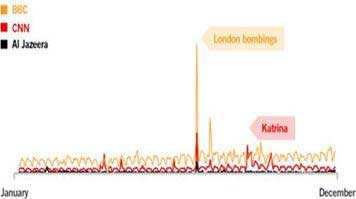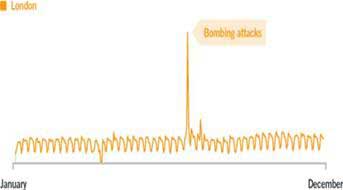In 2005, significant events such as the London bombings, Hurricane Katrina in the United States, and the death of the Pope led to a constant flow of information. As a result, the Internet became the primary “venue” for people to update and search for information about missing persons, the name of the new Pope, and more…
This is one of the reasons for the remarkable growth in the number of Internet users seeking news.
According to annual statistics from Google Zeitgeist, it is evident that during major global news events, the traffic on networks like BBC and CNN surged dramatically.

Statistics on network traffic of news agencies in 2005
On July 7, 2005, when the bombing occurred in London, the number of searches for the term “London” unexpectedly skyrocketed.

Statistics on searches for the term “London” during the year from Google Zeitgeist
Statistics in the United States indicate that about 30% of Internet users in the country check for news updates online daily. This steady growth poses a challenge for traditional media such as newspapers and television. The Audit Bureau of Circulation recently reported a dismal drop in their circulation numbers, reaching the lowest point since 1991.
Information about products and celebrities is also being sought online more than through headlines. Google statistics (the search engine that held nearly half of the Internet search market share in 2005) revealed that the names of the most famous celebrities of the year were among the top 10 search terms, with “Janet Jackson” leading the pack, while trendy products like the iPod also dominated the list of the top 10 searched products.
The development of the Internet and online services has significantly altered modern human habits. The speed of information updates on the Internet can be described as instantaneous, although it still cannot compare to the vibrancy and authenticity of live television programs.


















































